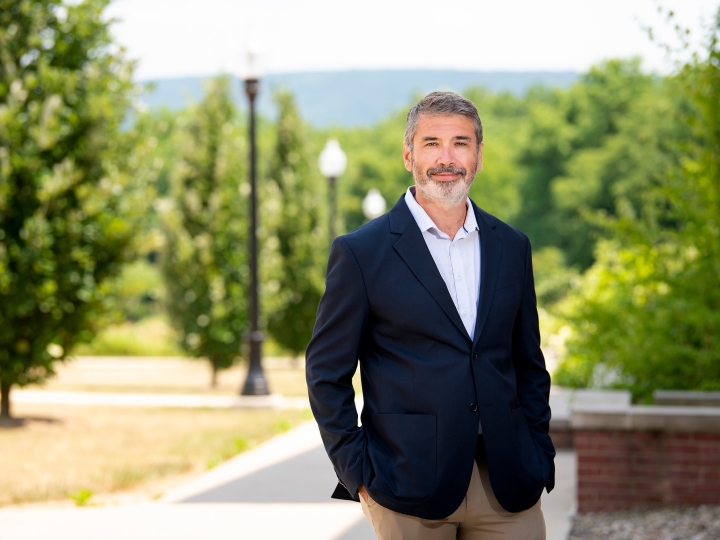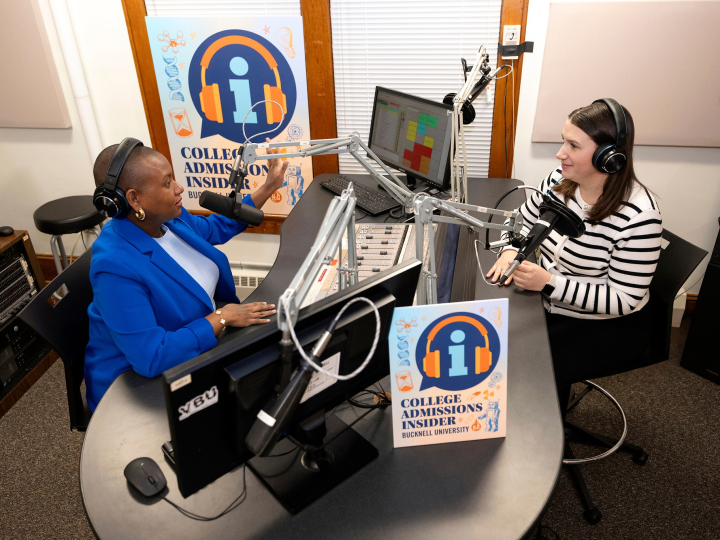Bucknell Diversity Summit Explores Questions of Identity and Inclusion
April 10, 2017
Ruairi Palmer '17 often hears the same question when he tells someone what he's majoring in at Bucknell University.
"They ask, 'You're a guy, so why are you majoring in women's studies?' " said Palmer, who also majors in biology. "The fact that it's so hard for someone to understand why a man would major in women's & gender studies is one of the reasons why everyone needs to have more discussion about gender in the first place."
Palmer spoke as part of a student panel at Bucknell's second annual Diversity Summit, "Identity, Inclusion & Social Transformation: Centering Gender, Power and Privilege," held March 28-29.
Consisting of more than a dozen events including panel discussions, workshops and keynote speakers, the summit focused on gender and its influence on societal norms — and how traditional notions of gender and sex are being challenged.
"The way in which we engage that world is very much connected to who we are," said Atiya Stokes-Brown, interim associate provost for diversity and professor of political science. "The distinction between sex and gender is very important — the former referring to physical or biological characteristics that define men and women and the later being the social roles and expectations we attach to different sexes. This means that what it means to be a woman or a man are cultural ideas that have evolved over time — and this is a profound moment where we are engaged in a national conversation and debate about gender and gender identity."
It was this increasingly visible debate that led Bucknell to devote this year's summit to issues of gender and sex. Stokes-Brown noted that they were only two of many facets of diversity, but in offering panels and workshops on issues like gender and scholarship, cultural issues, cultural appropriation in gender and gender disparity, the summit aimed to open multiple channels of discussion related to the theme.
"It's our responsibility to look at this national issue, critically examine how we interact with each other in the Bucknell community and recognize that when it comes to any aspect of identity, no one is 'just one thing,' " she said.
Dinner and a movie
The summit opened with a Community Dinner at Larison Dining Hall on March 28. The theme was "Breaking Gender" and featured student "plants" among the attendees, who purposely addressed others only in the context of the gender that they appeared to be, regardless of how that person might identify or how they reacted.
"It was really hard. I felt really uncomfortable addressing people that way when I had to act like I didn't care how they identified," said Zoe Russell '17. "I'm sure I offended some people."
Barry Jenkins, who directed the groundbreaking film Moonlight that took home Best Picture at this year's Academy Awards, delivered a keynote address after the Community Dinner at the Weis Center for the Performing Arts. Jenkins discussed his own experience as one of only five black students out of 30 in his film school class and the issues he sees with race and gender in film.
"Women behind the camera are still drastically underrepresented," he said. "Our film's editor was the first black woman to be nominated for film editing at the Oscars and it took until 2017 for that to happen."
Speaking the truth
The concept of race as an intersection to gender and diversity took center stage at "Write Out Loud — A Spoken-Word Workshop on Gender, Privilege and Power," which opened with a short spoken-word performance by the student moderators.
Russell, Ella Tazuana Johnson '17 and Anthony Scrima '18 performed "Diversity Ain't Diddly," which focused on discussions on how the topic of diversity at universities, including Bucknell, can be uncomfortable or seen by students of color as token efforts. However, engaging people through a creative channel like spoken word can be a positive action for change, Russell noted.
"It is important to promote social justice through as many venues as possible and creative writing is an extremely important venue, as art often reflects the state of our society and contributes greatly to its progress," she said.
First-hand experience
Another student-led panel, "WMST, Intersectionality and Student Experiences at Bucknell," brought gender and privilege to the table through personal accounts of students in WMST150, an introductory class to women's & gender studies.
During the hour-long panel, a half-dozen students, including Palmer, shared instances in which the class helped them recognize gender as a factor of diversity in their everyday lives. Others spoke about how simply walking into the classroom was an eye-opening experience.
"On the first day of class, I realized right away that it was predominantly female, which can be pretty startling if you're used to classes that are either pretty equal in terms of gender or even male-dominated," said Jamie Forrest '17.
"I knew immediately that this class would force me to think and to analyze situations differently about gender and I have," he added.

